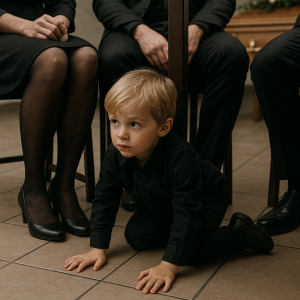My narcissistic sister once tried to end my life, and my family excused it as nothing more than a “joke.” Only now do they finally see how destructive she really is.
I’m the second-youngest of five. In the chaotic ecosystem of my family, that always meant being overlooked, my voice the quietest in the room. My older sister, let’s call her X, is five years older. We never had that storybook sisterly closeness—she saw me as an inconvenience, a nuisance. Her need to dominate was obvious even as a kid; if I got to choose the movie on family night, she acted like her whole world collapsed. By eighteen, I was used to being treated that way. I thought I understood our family’s unspoken rules. I was wrong.
As is so often the case, the spark that lit everything on fire was a wedding. At twenty-four, X got engaged to her boyfriend, Y, in a showy beach proposal complete with giant letters and rose petals. My parents were ecstatic. My siblings were supportive. And I, by decree of my mother, was enlisted as a bridesmaid.
What followed wasn’t wedding prep—it was a dictatorship in disguise. Instructions poured in through a shared spreadsheet, each line a fresh demand, each one heavier than the last.

The thirteen bridesmaids had to buy matching $300 blush dresses, plus shoes, professional hair and makeup, and pay for alterations. Every event was mandatory: an $800 spa day and a Toronto bachelorette at the Fairmont. We even had to attend vendor appointments—cake tastings, venue tours, catering trials—each billed at $25 per head. Guests themselves were told to pay a $150 deposit just to secure a seat. Gifts had to be cash, a check, or a registry item. Anything else would be returned.
My mother brushed it off with, “She’s just stressed, sweetheart.” But I knew better—this wasn’t nerves. This was control.
The rules grew uglier. Every bridesmaid had to attend six-weekly skin and hair appointments at her own expense to stay “picture-perfect.” Tattoos were forbidden unless covered. Hair colors had to remain “natural,” otherwise we’d need wigs. The dresses only went up to size 10. Anyone bigger was “expected to slim down.” I wear a size 12. She mailed me a keto book as a “hint.”
The breaking point for me was money. Her fiancé earned six figures in tech. She was a successful accountant. They didn’t need to do this. I, on the other hand, was scraping every dollar for my first year of university—a $17,000 tuition bill I had to pay on my own. Being her bridesmaid would cost me over $2,000. I didn’t have it, not without debt that would crush me.
When I tried to explain, she snapped, “It’s your duty as my sister to save up.” My parents—covering nearly $100,000 of the wedding—claimed they couldn’t help. The injustice ate at me until I couldn’t stay quiet anymore. With encouragement from my aunt, the only one who ever admitted my mom’s behavior wasn’t normal, I decided to confront them.
My mother avoided me for days. She claimed she was sick, then too busy helping X move into her fiancé’s condo, then simply “forgot.” When we finally sat down, I told them everything—the costs, the pressure, the cruelty. That’s when my dad’s face went rigid. He hadn’t known about the spreadsheet, the spa day, or the guest deposits.
Then he revealed something that changed my life: each of us kids had a $25,000 trust fund for education or a first home, available at nineteen. I had just turned nineteen. That money should have been mine.
But my mom confessed. After the engagement, X had come to her crying, insisting she was the “forgotten middle child.” She convinced my mom that since my two brothers in the military weren’t using their funds, those accounts could go toward her dream wedding. With hers and mine included, that made $100,000. The exact budget she wanted. My mom agreed, reasoning I’d already saved most of my tuition myself and could “make do.”
My dad was silent, his disappointment cutting deeper than anger. He sent me to my room. An hour later, my mother knocked, her eyes swollen. That’s when she told me everything—the secret she’d carried since my infancy.
After my birth, she suffered severe postpartum depression and spent four months in treatment. My dad juggled two young boys and a newborn with the help of a nanny. X, only five at the time, was left adrift—fed and clothed, yes, but emotionally abandoned. When my mom returned, X’s resentment wasn’t aimed at her but at me, the baby who “took” her mother away. One day, she pressed a pillow over me. My mom caught her just in time.
The family reframed it as a “funny childhood story.” But the truth was darker. Therapy followed, but X quickly learned how to manipulate her doctors. My mom, drowning in guilt, spent decades overcompensating—giving X everything, no matter the cost. The wedding was simply her biggest power play yet.
My dad, finally seeing the full picture, demanded X come home. She stalled, but eventually arrived. Sweet as sugar until her future mother-in-law left, then venomous as ever. What followed was the worst fight I’ve ever witnessed—screaming, threats, manipulation. She accused me of ruining her life, threatened to cut them off from future grandchildren, and sneered that I was “fat and lazy.” But this time, my dad didn’t waver.
The confrontation ended with X storming out, disowning us all. My father later canceled my student loan, transferred my trust into my name, and promised my first year’s tuition and housing were covered. X got $15,000—barely enough to salvage her non-refundable deposits. Her in-laws chipped in another $15,000, and her extravagant ski-hill wedding vanished.
Her final words to me were in a text: “You’re dead to me.” The relief I felt was indescribable. I hadn’t lost a sister—I’d finally escaped a tormentor.
Three months later, therapy was underway. My mom and I grew closer than ever. My dad became my fiercest defender. My brothers, granted leave from duty, joined sessions and admitted they hadn’t realized how bad things were. Slowly, painfully, we began to heal.
I started university in Ottawa. I found a kind, supportive boyfriend in the army. My oldest brother is marrying a wonderful woman who’s asked me to be her Maid of Honor—the sister I never had.
X, meanwhile, rushed her wedding, had her baby, and cut us off completely. Her in-laws bad-mouth us, but we no longer care.
The most important thing I learned is this: family isn’t about sacrificing yourself to keep others warm. Real family brings you the blanket. And for the first time in my life, I feel like I’m finally wrapped in one.









